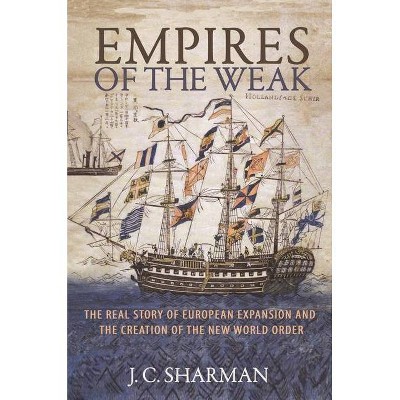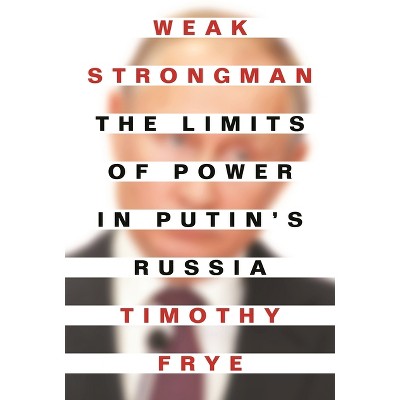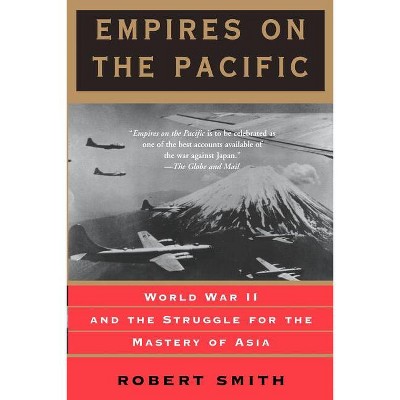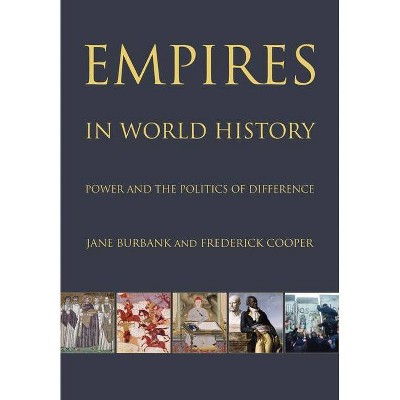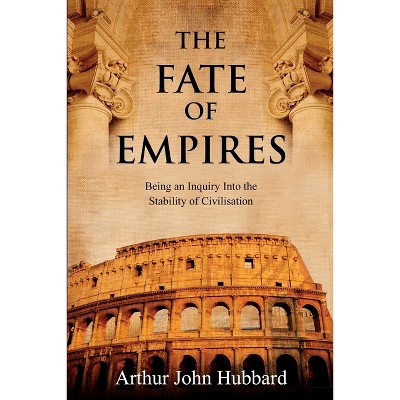Sponsored

Empires of the Weak - by J C Sharman (Hardcover)
$39.95Save $2.05 (5% off)
In Stock
Eligible for registries and wish lists
Sponsored
About this item
Highlights
- How the rise of the West was a temporary exception to the predominant world order What accounts for the rise of the state, the creation of the first global system, and the dominance of the West?
- About the Author: J. C. Sharman is the Sir Patrick Sheehy Professor of International Relations in the Department of Politics and International Studies at the University of Cambridge and a fellow of King's College.
- 216 Pages
- History, World
Description
About the Book
What accounts for the rise of the state, the creation of the first global system, and the dominance of the West? The conventional answer asserts that superior technology, tactics, and institutions forged by Darwinian military competition gave Europeans a decisive advantage in war over other civilizations from 1500 onward. In contrast, Empires of the Weak argues that Europeans actually had no general military superiority in the early modern era. J. C. Sharman shows instead that European expansion from the late fifteenth to the late eighteenth centuries is better explained by deference to strong Asian and African polities, disease in the Americas, and maritime supremacy earned by default because local land-oriented polities were largely indifferent to war and trade at sea. Europeans were overawed by the mighty Eastern empires of the day, which pioneered key military innovations and were the greatest early modern conquerors. Against the view that the Europeans won for all time, Sharman contends that the imperialism of the late nineteenth and early twentieth centuries was a relatively transient and anomalous development in world politics that concluded with Western losses in various insurgencies. If the twenty-first century is to be dominated by non-Western powers like China, this represents a return to the norm for the modern era. Bringing a revisionist perspective to the idea that Europe ruled the world due to military dominance, Empires of the Weak demonstrates that the rise of the West was an exception in the prevailing world order.Book Synopsis
How the rise of the West was a temporary exception to the predominant world order
What accounts for the rise of the state, the creation of the first global system, and the dominance of the West? The conventional answer asserts that superior technology, tactics, and institutions forged by Darwinian military competition gave Europeans a decisive advantage in war over other civilizations from 1500 onward. In contrast, Empires of the Weak argues that Europeans actually had no general military superiority in the early modern era. J. C. Sharman shows instead that European expansion from the late fifteenth to the late eighteenth centuries is better explained by deference to strong Asian and African polities, disease in the Americas, and maritime supremacy earned by default because local land-oriented polities were largely indifferent to war and trade at sea. Europeans were overawed by the mighty Eastern empires of the day, which pioneered key military innovations and were the greatest early modern conquerors. Against the view that the Europeans won for all time, Sharman contends that the imperialism of the late nineteenth and early twentieth centuries was a relatively transient and anomalous development in world politics that concluded with Western losses in various insurgencies. If the twenty-first century is to be dominated by non-Western powers like China, this represents a return to the norm for the modern era. Bringing a revisionist perspective to the idea that Europe ruled the world due to military dominance, Empires of the Weak demonstrates that the rise of the West was an exception in the prevailing world order.Review Quotes
"[Empires of the Weak is] intellectually challenging and makes observers think about where they stand before they call in their bets on the sweep of history. . . . people who are willing to challenge their views . . . should relish the book."---I. William Zartman, Rest Journal
"[A] provocative argument . . . As a critique of prevailing modes of thinking about global politics, Empires of the Weak succeeds admirably."---Alan Mikhail, New York Times Book Review
"An interesting and thought-provoking narrative. . . . Empires of the Weak is a valuable addition to the underrepresented topic of non-Western military history as part of the growing literature on the underlying causes of the great divergence from the vantage point of global military and political history."---Kaveh Yazdani, International Review of Social History
"Sharman builds a provocative, yet cogent argument, wide-ranging and readable."---Ephraim Nissan, Quaderni di Studi Indo-Mediterranei
"Without assuming prior knowledge, Empires of the Weak, demonstrates the problems with the theoretical assumptions of the military revolution thesis."---Sarah Kinkel, Times Higher Education
About the Author
J. C. Sharman is the Sir Patrick Sheehy Professor of International Relations in the Department of Politics and International Studies at the University of Cambridge and a fellow of King's College. His books include The Despot's Guide to Wealth Management and International Order in Diversity. He lives in London.Dimensions (Overall): 9.4 Inches (H) x 6.3 Inches (W) x 1.0 Inches (D)
Weight: 1.05 Pounds
Suggested Age: 22 Years and Up
Sub-Genre: World
Genre: History
Number of Pages: 216
Publisher: Princeton University Press
Format: Hardcover
Author: J C Sharman
Language: English
Street Date: February 5, 2019
TCIN: 93121554
UPC: 9780691182797
Item Number (DPCI): 247-26-3996
Origin: Made in the USA or Imported
If the item details aren’t accurate or complete, we want to know about it.
Shipping details
Estimated ship dimensions: 1 inches length x 6.3 inches width x 9.4 inches height
Estimated ship weight: 1.05 pounds
We regret that this item cannot be shipped to PO Boxes.
This item cannot be shipped to the following locations: American Samoa (see also separate entry under AS), Guam (see also separate entry under GU), Northern Mariana Islands, Puerto Rico (see also separate entry under PR), United States Minor Outlying Islands, Virgin Islands, U.S., APO/FPO
Return details
This item can be returned to any Target store or Target.com.
This item must be returned within 90 days of the date it was purchased in store, shipped, delivered by a Shipt shopper, or made ready for pickup.
See the return policy for complete information.
Trending Non-Fiction

$15.68
Buy 2, get 1 free select books
4.7 out of 5 stars with 182 ratings

$19.31
was $20.98 New lower price
Buy 2, get 1 free select books
4.1 out of 5 stars with 54 ratings

$19.58
MSRP $29.00
Buy 2, get 1 free select books
4.7 out of 5 stars with 11 ratings

$4.59
MSRP $7.99
Buy 2, get 1 free select books
4.8 out of 5 stars with 116 ratings

$6.20
MSRP $10.95
Buy 2, get 1 free select books
4.8 out of 5 stars with 33 ratings

$7.09
MSRP $9.99
Buy 2, get 1 free select books
4.9 out of 5 stars with 45 ratings
